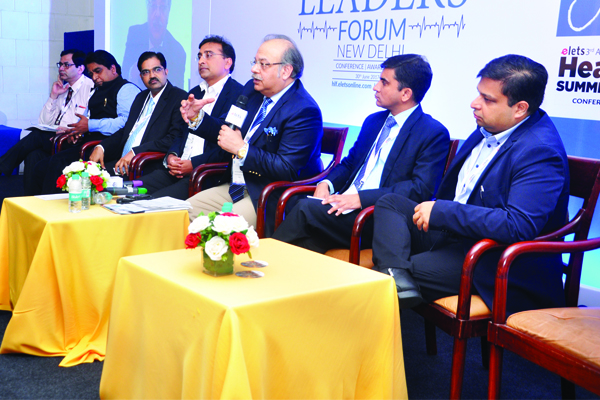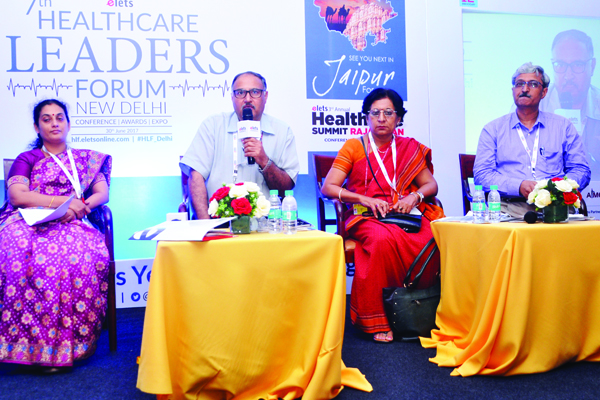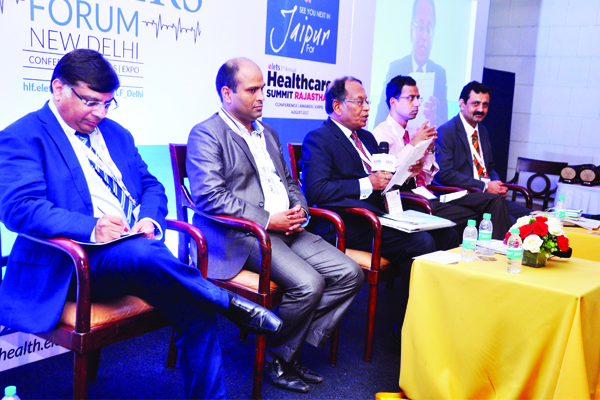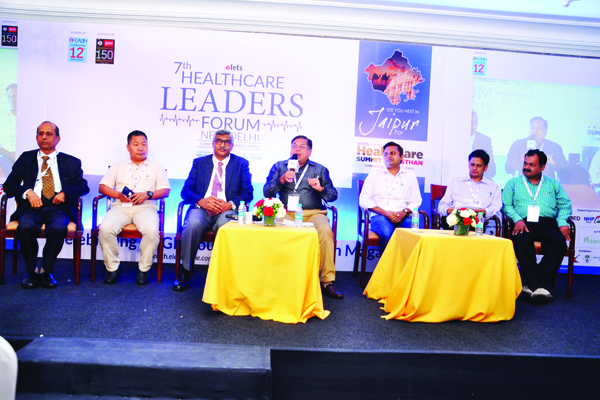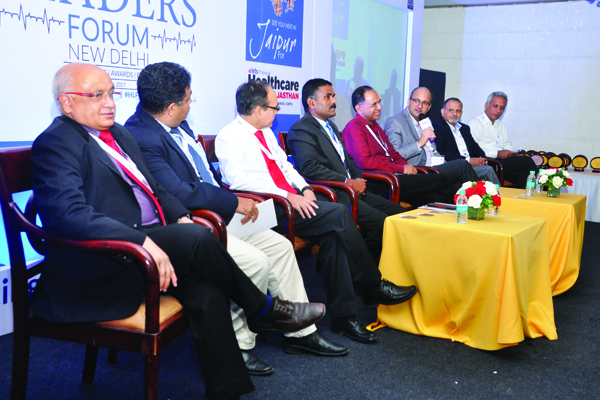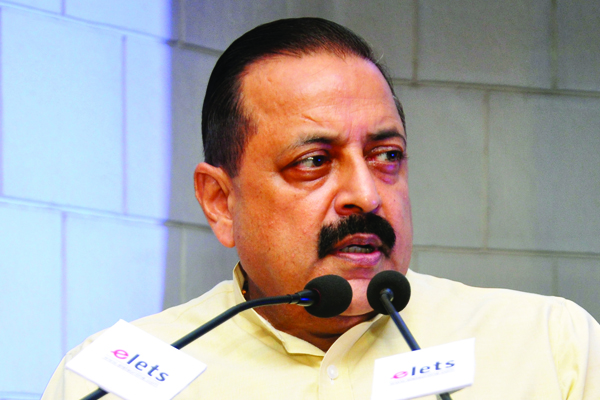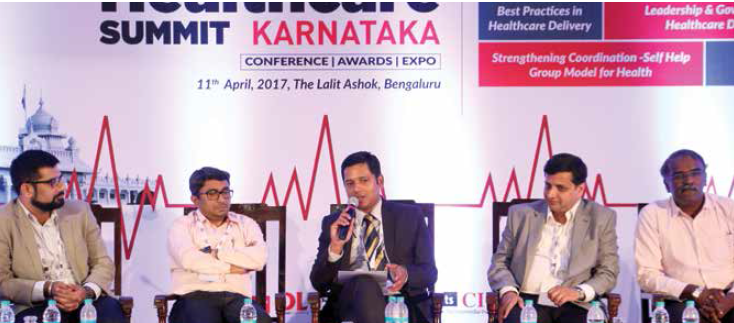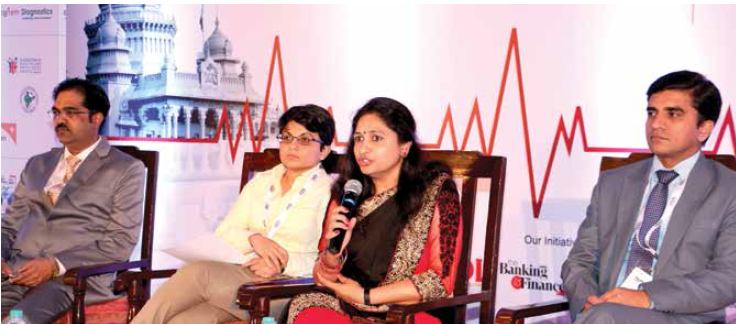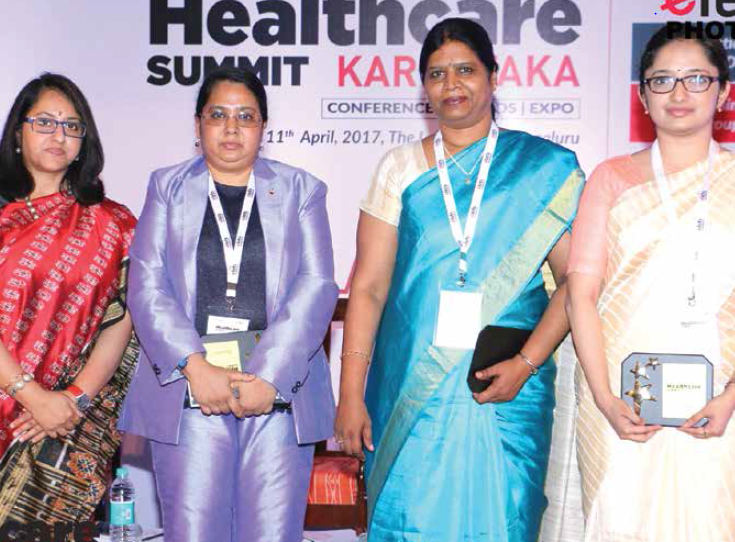

The healthcare sector is witnessing a paradigm shift , with the focus of government policies shifting towards providing inclusive and value-based healthcare. The Karnataka Healthcare Summit-2017 set a major milestone for the sector by pushing for restructuring the healthcare delivery system by adopting new innovations, replicating fresh models and initiatives to make it more outcome focused. The summit has marked a new beginning in the Indian healthcare space by underscoring the need to make a collaborative and focused effort to take healthcare to publics doorstep.

Conference Report
utive Summary
The Elets Healthcare Summit in Karnataka witnessed congregation of policy makers, district and taluk health officers, district surgeons, technical experts, hospital, insurance companies and several private players operating in the healthcare segment – all under the same roof.
The day-long summit, held on 11th April, hosted by the Government of Health & Family Welfare, the National Health Mission and Suvarna Arogya Suraksha Trust with the support of Elets. The summit had two segments wherein panellists on one side hosted discussions on wide range of themes. The companies on the other got an opportunity to showcase their products and devices through an expo exhibition.

The summit witnessed discussions on various aspects of quality healthcare delivery including “ leadership and governance, health financing and CSR initiatives, significance of PPP model in healthcare, role of Self Help Groups and the important role being played by ICT in healthcare to make delivery of quality health services more inclusive.
Inaugurati on of the Event by the Karnataka Health Minister, KR Ramesh Kumar
The summit was inaugurated by K R Ramesh Kumar, Minister for Health and Family Welfare, Government of Karnataka along with Shailaja Teacher, Minister for Health and Social Welfare Minister, Government of Kerala, Dr K Rajeshwara Rao, IAS, Joint Secretary of Ministry of Health and Family Welfare, Government of India, Dr Rathan Kelkar, Mission Director, National Health Mission and utive Director, Suvarna Arogya Surakhsa Trust, and head of companies including The New India Assurance Company, Biocon Foundati on and PerkinElmer Pvt. Ltd.
This session emphasised on the aspect of health for all as being the mandate of Karnataka and Kerala Government and representatives from the Central Government further emphasised on new healthcare policies that aim at a more inclusive approach towards extending healthcare coverage and access to citizens. The representatives of private companies talked about the increasing role of insurance and CSR initiatives which aid the governments efforts towards securing better healthcare for all.
Panel 1: Leadership and Governance in Healthcare Delivery
In the first session, panellists deliberated on the role of leadership and governance in healthcare delivery. The panellists included speakers from organisations such as Public Health Foundation of India, United Nations Development Programme (UNDP) and head of Manipal Hospitals among others.
Panellists covered a host of issues while speaking about their experiences in using artificial intelligence in improving healthcare, conducting cost benefit analysis and targeting specific interventions to address the gaps in supply chain management of health delivery systems. The key takeaway from this session was that health remains a public good and even with the advent of technology, role of government leadership remains more of an art than a science. Innovation in government leadership demands: experimentation, rejection of outdated policies, asking correct questions, data driven decision making, incentives for service providers and sufficient budgetary outlay towards health.
Panel 2: Strengthening Coordination “ Self-Help Group Model for Health
The second panel comprised local leaders from Karnataka and Kerala along with experts from the UNESCO who emphasised on the self-help group (SHG) model of health. The example of Kudumbashri in Kerala as a classic case of decentralised decision making was extensively deliberated upon and the speakers mentioned the success of this initiative in a state where health seeking behaviour of people remains high. The lesson learnt was that Kudumbashri holds a legal backing and through its bottom-top structured approach, it provides sufficient incentive to grassroots community which further enables participation in the scheme. Other speakers emphasised that a message that health is a value of life must be disseminated in the community and at family level. This session and its takeaways remained vital for various district and regional health officers from Karnataka who participated in the summit.
Panel 3: Best Practices from Healthcare Delivery from Indian States
The third panel comprised representatives from the Governments of Karnataka, Kerala and Puducherry who shared their experiences and views on health services delivery in their respective states. The session was led by Dr Rathan Kelkar from Karnataka.
He emphasised on the poor awareness about health insurance and assurance in India building on a National Family Health Survey for which stated that just 17% of Indian people are covered by health insurance. He cited example of Karnataka which has over 90% coverage in tertiary care as a testament to this. He also underlined the successful model of Self Help Groups (SHGs) being used in Kerala and stated that Karnataka should study this model to introduce community participati on with the aim of improving health coverage awareness.
Following his opening remarks, representatives from Kerala and Puducherry made presentations about their respective health schemes in implementation. Kerala, in particular, highlighted its schemes which are targeted at specific health conditions rather than at specific population, which makes it easier to eliminate/reduce the impact caused by serious health conditions across the State. The highlight of the presentation from Kerala was the acknowledgement of the difficulties the State faced in scaling up initiatives from pilot projects to large scale programmes.
From Puducherry, the highlight was their spending on healthcare which is 10% of their budget and over 2.5% of their GDP. Puducherry also has a well-functioning patient referral system from government to private hospitals being examined by Karnataka.
Panel 4: Health System Financing and CSR in Healthcare
The fourth discussion was focussed on the theme of health system financing management and CSR initiatives in healthcare. Chaired by Dr Sudha Chandrashekhar, Director (Medical Management), SAST, this session involved panellists from WHO and private companies and foundations discussing their CSR stories.
The representative of WHO provided an extensive presentation on various forms of health financing models prent across the world and touched upon best practices emanating from Turkey, Brazil, Thailand, Ghana, the Philippines, China, the US and Maldives. The takeaway from these best practices reveal that states must focus on the entire health financing architecture and invest in strategic purchasing and targeted financing in order to be responsible towards outcomes and deliveries under health management systems. The source of funding must be diversified and pooled together for streamlined financing flows. It was further emphasised that EHR and revamping supply chain management would remain game changers for health industry in India. A discussion on designing appropriate Public Private Partnership (PPP) models and stronger contracts between hospitals and government also followed.
Another takeaway included the benefits that private sectors draw from government financing and thus partnerships between government and private sector must be a two-way route where they mutually work for each others benefits.
Panel 5: ICT in Healthcare
Led by Dr Rathan Kelkar, this diverse panel various players in the healthcare sector, from grassroots workers to technology companies developing tools. Dr Kelkar began by stressing the governments commitment to using ICT in healthcare by stating that about 40 different soft wares were currently being used in healthcare by the government. However, he also maintained that the government is working towards bringing the data together in such a way that it is easier to draw conclusions and report findings from the data collected by all of these soft – wares. He emphasised the importance of ICT in healthcare by giving various examples of how IT has been used and is being used in Karnataka.
Following him, other panellists also made strong points for the use of ICT in healthcare. Panellists stressed that technology companies must recognise the need for IT in health and develop solutions to the identified problems rather than provide solutions for non-existent problems. The idea of technology for the sake of technology was endorsed on this panel which called for useful technical solutions in health.
The highlight of this session was the acknowledgement of challenges that ICT in health faces including that of adoption and implementation challenges. These range from slowing the speed of the physician, making treatment impersonal, increasing costs etc. Apart from this, maintenance and continuity of IT, data privacy of people, corruption in IT adoption by government and introducing IT as a subject in medical education were also discussed.
The session was concluded with Dr Kelkar outlining the proposed and ongoing initiatives in health in Karnataka such as virtual clinics, capacity building through IT, improving data analytics etc.
Be a part of Elets Collaborative Initiatives. Join Us for Upcoming Events and explore business opportunities. Like us on Facebook , connect with us on LinkedIn and follow us on Twitter , Instagram.


